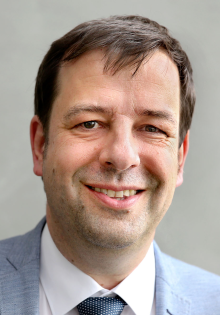A computer that can calculate hundreds of scientific tasks simultaneously and thus helps provide a solution to key social challenges: this is the new IT heart of Paderborn University. The ‘Otus’ supercomputer was put into operation at the Paderborn Center for Parallel Computing (PC2) on Monday 10 November. From now onwards, researchers all over Germany can use it to run challenging computer simulations and conduct scientific enquiry at the highest level.
‘High-performance computing is hugely relevant to the pressing challenges of our time. Researchers can use supercomputers to trawl through huge quantities of data within a short period of time and identify patterns. Experiments that would be extremely expensive, dangerous or quite simply impossible can be simulated. As a result, this also allows us to make predictions about potential future developments. I am delighted that here in Paderborn, we have access to state-of-the-art, world-class infrastructure in this area thanks to PC2 and “Otus”’, Paderborn University’s President Professor Matthias Bauer said at the opening ceremony.
The questions being tackled by Paderborn’s supercomputers are wide-ranging. ‘For example, fundamental research can involve understanding physical and chemical processes on an atomic level – something that is often quite simply impossible using experiments alone. Other projects have a direct practical benefit, such as optimising container ship routes to reduce fuel consumption, improving the efficiency of solar cells, or developing new, more energy efficient AI methods’, explained Professor Christian Plessl, a computer scientist at Paderborn’s Department of Computer Science and head of PC2.
Computing capacity for the national scientific landscape
As a national high-performance computing centre, PC2 is offering scientists all over Germany access to the ‘Otus’ supercomputer (like its predecessor ‘Noctua 2’). This access is granted via an application procedure, where an independent reviewer assesses the scientific quality and suitability of the application’s computing time requirements. Users can submit their tasks to a smart queuing system and the simulations are then automatically performed as soon as the computer has sufficient computing time available. ‘This allows us to keep the computer in operation 24 hours a day, 365 days a year’, Professor Plessl added.
‘Otus’ is also making waves in terms of sustainability: for example, indirect free cooling enables the supercomputer to be operated in an energy-efficient way all year round, with the exhaust heat being used for heating campus buildings. The electricity comes from renewable sources and is thus carbon-free. In addition, Paderborn University has already secured fifth place in the ‘Green500’ ranking for the world's most efficient computing systems.
The file system – with five petabytes of storage capacity, 42,656 processor cores and 108 GPUs – was developed by Lenovo in conjunction with pro-com Datensysteme GmbH. ‘Technology is only valuable if it is usable and useful. Where this is the case, such as here in Paderborn, enormous computing power generates knowledge. We at Lenovo want to develop technologies that are innovative but also practicable for everyone. The team at Paderborn University motivated us to do just that. We are excited to see the results of cutting-edge research’, said Andreas Thomasch, Director and Chief Technology Officer of Lenovo GAT. ‘The “Otus” supercomputer is not just performative, it is also very efficient. We are delighted to have been part of this installation’, Torsten Keuter of AMD added.
Professor J?rg Behler of Ruhr University Bochum gave a speech at the opening ceremony on the topic of ‘Modern computer simulations in chemistry: machine learning or quantum mechanics?’. Professor Stefan Schumacher and Professor Axel Ngonga, both of Paderborn University, also spoke about quantum photonics and language models. The computing centre was then opened for visitors to view.
Further information is available at the High Performance Computing topic page and on the PC2 website.






